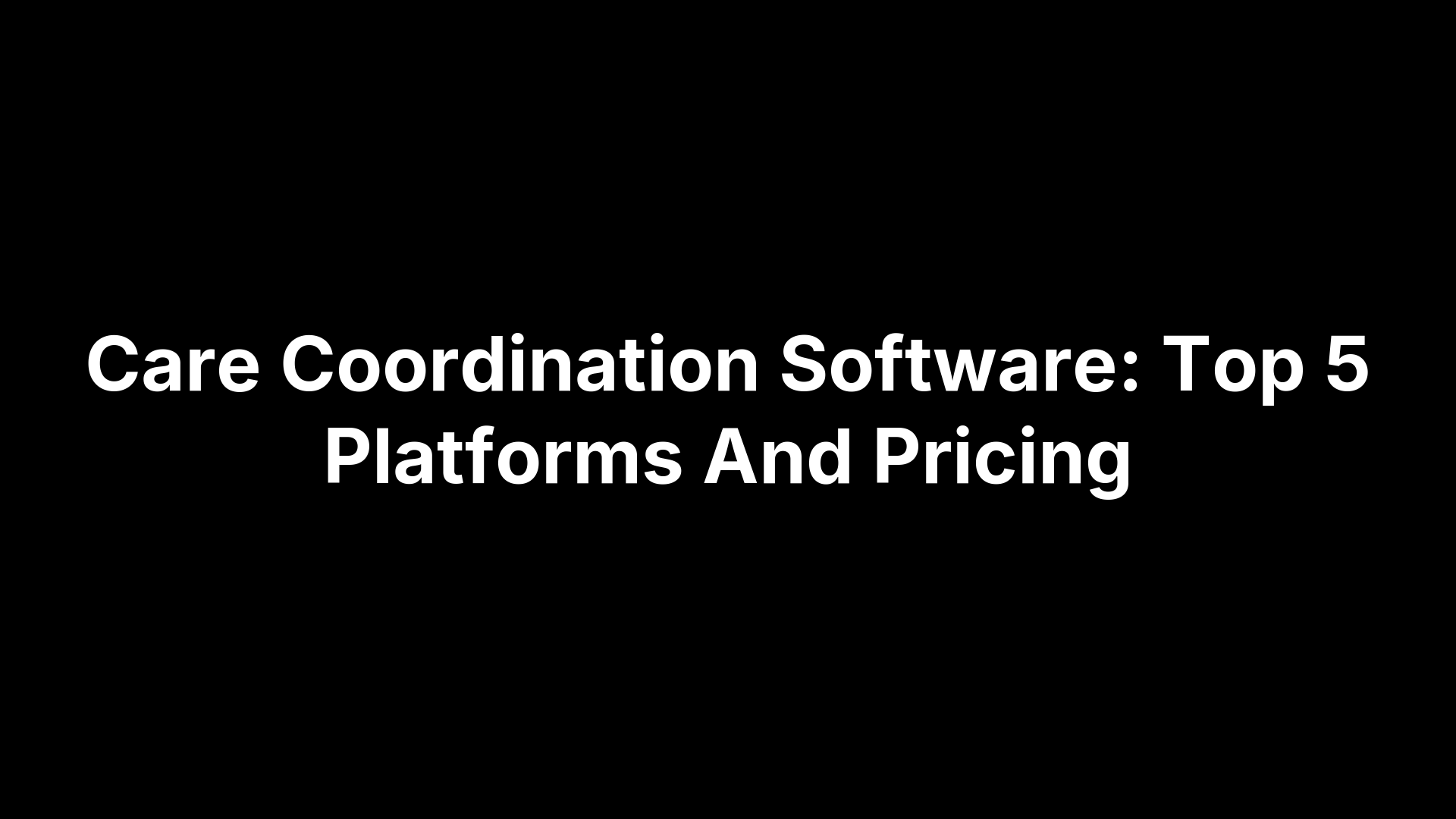Care Coordination Software: Top 5 Platforms And Pricing


Care Coordination Software: Top 5 Platforms And Pricing
Care coordination shouldn’t require three phone calls, two spreadsheets, and a prayer. Yet many teams still juggle transports, home health, DME, referrals, and authorizations across siloed tools—inviting delays, missed handoffs, and rising costs. If you’re comparing software, you’re likely trying to tame the chaos: unify communication, automate routine steps, plug into your EHR and billing systems, manage a vendor network with confidence, and get visibility you can act on. Bonus points if AI can take on dispatching and repetitive work without adding complexity or risk.
This guide compares the top five care coordination platforms and what they cost, so you can move from research to shortlist with clarity. We break down how each system works, who it’s best for, and the pricing models you can expect—covering VectorCare, athenahealth, Innovaccer, PointClickCare, and Salesforce Health Cloud. Along the way, we highlight must-have features like interoperability, workflow automation, vendor management, and analytics to help you gauge fit and ROI. Ready to see which option aligns with your operations and budget? Let’s dig in.
1. VectorCare
VectorCare is care coordination software built to tame patient logistics across transport, home health, and DME—on one platform. Teams book services in minutes, message in real time, automate dispatch, manage a compliant vendor network, reconcile invoices, and surface insights for smarter planning. AI agents offload repetitive work without adding process debt.
How VectorCare works
VectorCare unifies workflows so coordinators, dispatch, and vendors move in lockstep. Its modular suite plugs into EHR, CAD, and billing systems to keep data flowing and handoffs clean.
- Hub (no‑code workflows): Orchestrate scheduling, protocols, secure messaging, and PCS signatures.
- Trust (vendor network): Onboard, credential, and enforce policies across contracted providers.
- Pay (invoicing/payments): Create custom invoices and accept ACH/credit cards with notifications.
- Insights (BI): ML‑powered dashboards for performance, resource planning, and KPIs.
- ADI (AI dispatch): Automate scheduling, price negotiation, resource management, and billing tasks.
- Connect (integrations): Seamless links to third‑party EHR, CAD, and billing platforms.
Who VectorCare is for
Purpose‑built for organizations coordinating diverse services at scale, with a premium on speed, compliance, and transparency.
- Hospitals/health systems: Case management, patient flow, and transitions of care.
- EMS/NEMT providers: Dispatch automation and contract compliance.
- Home health & DME: Timely visits, deliveries, and documentation.
- Payers and public agencies: Vendor oversight and measurable outcomes.
VectorCare pricing
Pricing is custom based on volume, modules, and integrations. Organizations adopt VectorCare for measurable ROI—customers report up to a 90% reduction in scheduling time and savings exceeding $500,000 annually for large hospitals—while unifying transport, home care, and DME coordination under one platform.
2. Athenahealth care coordination
Athenahealth offers care coordination software layered on its cloud-based EHR and patient engagement tools. With a network of 160K+ providers, the platform focuses on making coordination between internal teams and external specialists easier and more efficient—so information moves, decisions speed up, and handoffs are cleaner.
How Athenahealth works
Athenahealth connects clinical documentation, communications, and coordination workflows in one cloud platform. It integrates patient information from multiple sources to present a holistic view of health, and applies AI and machine learning to accelerate documentation so clinicians can spend more time on care.
- Cloud EHR + engagement: Centralizes records and patient communications in a single, accessible workspace.
- 160K+ provider network: Facilitates coordination with external specialists and community partners.
- Integrated patient data: Pulls information from multiple sources for a complete patient picture.
- AI/ML assistance: Supports faster documentation and streamlined workflows for care teams.
Who Athenahealth is for
Athenahealth fits organizations that want coordination to live where clinicians already work: inside a modern, cloud EHR with built-in patient engagement and a broad provider network for external collaboration.
- Multi-specialty and group practices needing smoother referrals and shared care.
- Health systems coordinating with external specialists and affiliated clinics.
- Care teams prioritizing patient engagement alongside efficient documentation.
Athenahealth pricing
Athenahealth does not publish public pricing for its care coordination capabilities. Total cost varies by modules (EHR, engagement, coordination), scale, integrations, and services. For market context, ThoroughCare reports care coordination software can range from about $0.99–$8 per managed patient per month, with full-service programs at $20–$30 PPPM; actual Athenahealth pricing may differ and is typically tailored to scope and volume. Request a tailored quote and confirm inclusions (users, interfaces, support, and implementation).
3. Innovaccer care management
Innovaccer’s care management platform centers on interoperability and automation to help providers coordinate care, reduce operational drag, and support value-based care goals. It unifies fragmented data, gives teams a 360-degree patient view, and applies analytics to prioritize work that moves outcomes.
How Innovaccer works
Innovaccer integrates clinical, financial, and operational data to create a single, longitudinal record, then layers analytics and AI-driven tooling over customizable workflows. Care teams use this foundation to coordinate plans, engage patients, and measure impact.
- Comprehensive data integration: Builds a 360-degree patient view by unifying disparate sources.
- Advanced analytics/reporting: Surfaces risk, gaps, and performance trends to guide action.
- Care coordination + engagement: Tools to manage care plans and communicate with patients.
- Customizable workflows: Adaptable pathways that align with organizational processes.
Who Innovaccer is for
Innovaccer suits healthcare delivery organizations that need enterprise-grade care coordination software tied to population health and value-based performance—especially those battling data silos and clinician burnout.
- Health systems and large provider groups seeking unified care management and insights.
- Care management teams coordinating multi-condition, multi-site populations.
- Organizations pursuing value-based care that need analytics to track outcomes and utilization.
Innovaccer pricing
Innovaccer does not publish public pricing. Total cost varies by scope (modules, data sources, users), scale, integrations, and services. For market context, care coordination software can range from roughly $0.99–$8 per managed patient per month, with full-service programs at $20–$30 PPPM; Innovaccer’s enterprise pricing may differ. Request a tailored quote and confirm inclusions across implementation, interfaces, analytics seats, and support.
4. PointClickCare
PointClickCare positions its AI-powered healthcare software to transform care coordination and outcomes by improving collaboration, reimbursement, and transitions of care. If your priority is getting the right information to the right team at the right time—and making handoffs and billing cleaner—PointClickCare is built to make coordination feel seamless instead of fragmented.
How PointClickCare works
PointClickCare streamlines day-to-day coordination while supporting revenue integrity and smoother care transitions. Its AI-driven capabilities aim to keep teams aligned and patients moving safely across settings without administrative friction.
- AI-enabled collaboration: Coordinates work across care teams to reduce gaps and delays.
- Reimbursement support: Tools designed to improve documentation and billing accuracy.
- Transitions of care: Features that help organize discharges, referrals, and follow-ups.
- Outcome focus: Capabilities oriented toward measurable improvements in coordination.
Who PointClickCare is for
PointClickCare fits organizations that need care coordination software centered on collaboration, reimbursement workflows, and transition management—without forcing teams into complicated processes.
- Provider organizations seeking tighter, AI-assisted team coordination.
- Operations and revenue leaders focused on reimbursement accuracy.
- Care management teams driving consistent, timely transitions of care.
PointClickCare pricing
PointClickCare does not publish public pricing. Total cost varies by scope (modules, users, data connections), volume, and services. For market context, ThoroughCare reports care coordination software ranges from about $0.99–$8 per managed patient per month, with full-service programs at $20–$30 PPPM; actual PointClickCare pricing may differ.
- Request a tailored quote: Confirm modules, user tiers, and integrations.
- Clarify services: Implementation, training, support SLAs, and data migration.
- Align on outcomes: Reporting, adoption plans, and success metrics included.
5. Salesforce Health Cloud
Salesforce Health Cloud brings care coordination software together with an AI-enabled CRM foundation to give teams a 360-degree view of each patient. By unifying medical records, treatment plans, and social determinants of health into a single profile, it helps care teams collaborate, personalize interventions, and automate routine operations at scale.
How Salesforce Health Cloud works
Built on Salesforce’s CRM, Health Cloud assembles clinical and nonclinical data into unified patient profiles and powers coordination with configurable workflows. The goal: faster collaboration, clearer handoffs, and consistent follow-through across providers and community partners.
- 360-degree patient profiles: Integrates medical records, care plans, and social determinants of health.
- Collaborative workflows: Keeps teams aligned to deliver coordinated, timely care.
- Personalized care + automation: Uses an AI CRM base to tailor outreach and streamline operations.
- Enterprise scale and integration: Designed for scalability with strong integration capabilities.
Who Salesforce Health Cloud is for
Health Cloud suits organizations that need enterprise-grade coordination spanning hospitals, clinics, and community resources—especially where clinical data must live alongside social and operational context to inform care plans.
- Provider organizations and multi-site networks coordinating across service lines and settings.
- Care management teams that need patient engagement plus consistent, configurable workflows.
- Operations leaders looking to standardize processes and measure impact at scale.
Salesforce Health Cloud pricing
Salesforce does not publish public pricing for Health Cloud. Costs vary by modules, users, integrations, and services. For market context, ThoroughCare notes care coordination software can range from about $0.99–$8 per managed patient per month, with full-service programs at $20–$30 PPPM; Salesforce’s enterprise pricing may differ.
- Request a tailored quote: Confirm modules, user tiers, and data sources.
- Scope services: Implementation, workflow configuration, training, and support SLAs.
- Validate integrations: EHR, data feeds, and enterprise systems included.
- Align success metrics: Reporting, adoption plans, and governance.
Next steps
You’ve got a clear view of the top platforms and how they approach coordination. The fastest path to value is to pressure-test each against your real workflows, data flows, and cost profile. Anchor the decision on measurable outcomes—fewer handoffs dropped, faster scheduling, cleaner billing—plus how well the platform automates low‑value work without disrupting clinicians. Then choose the partner that proves adoption and interoperability, not just demos.
- Define priority use cases and success metrics (time‑to‑schedule, no‑show rate, billing accuracy).
- Map integrations and data sources (EHR, CAD, billing, CRM).
- Run a time‑boxed pilot with real sites and vendors; train staff and measure adoption.
- Model total cost of ownership: licenses, interfaces, services, support.
If patient logistics is central to your coordination strategy, see how VectorCare unifies transport, home care, and DME on one AI‑powered platform.
The Future of Patient Logistics
Exploring the future of all things related to patient logistics, technology and how AI is going to re-shape the way we deliver care.



